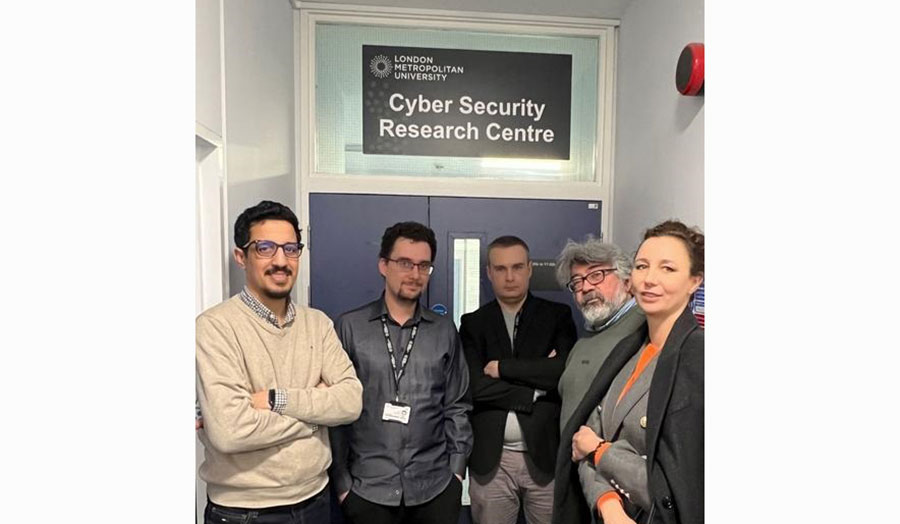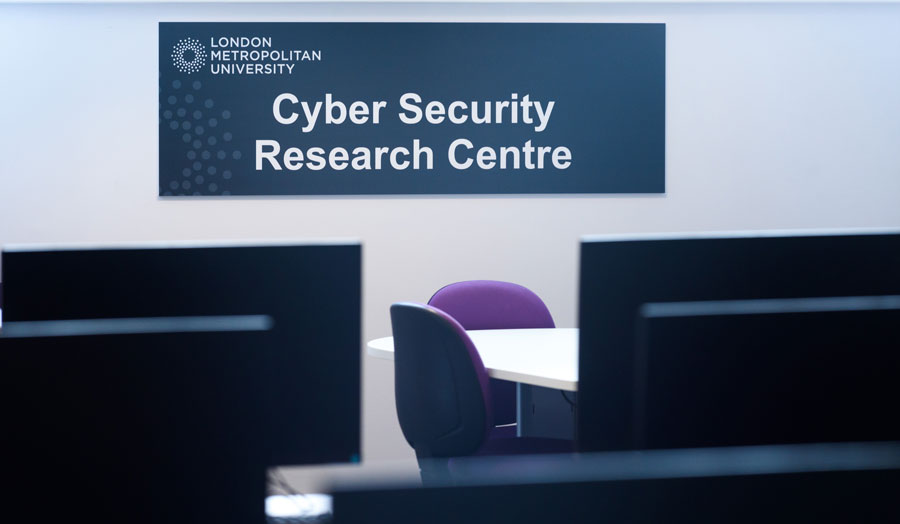Apply for this course
Please select when you would like to start:
If you're a UK applicant wanting to study full-time starting in September, you must apply via UCAS unless otherwise specified. If you're an international applicant wanting to study full-time, you can choose to apply via UCAS or directly to the University.
If you're applying for part-time study, you should apply directly to the University. If you require a Student visa, please be aware that you will not be able to study as a part-time student at undergraduate level.
Why study this course?
Our Digital Forensics and Cyber Security (including foundation year) BSc (Hons) is a four-year degree with a built-in foundation year (Year 0), providing a route into higher education if you don’t meet the entry requirements for an undergraduate degree.
You will be taught within the Cyber Security Research Centre, which is a dedicated collaborative facility launched in 2018 to bring our industry partners into the University. You will be exposed to live projects from a variety of industries from within the fintech, cyber security and digital forensic businesses.
Our Digital Forensics and Cyber Security (including foundation year) BSc degree has been accredited with full CITP status by BCS, The Chartered Institute for IT. This accreditation is a mark of assurance that the degree meets the standards set by BCS. As a graduate of this course, accreditation will also entitle you to professional membership of BCS, which is an important part of the criteria for achieving Chartered IT Professional (CITP) status through the Institute. Some employers recruit preferentially from accredited degrees, and an accredited degree is likely to be recognised by other countries that are signatories to international accords.
100% overall satisfaction
Our Digital Forensics and Cyber Security course ranked first in the country with 100% overall satisfaction, a 100% rating for the teaching on the course and 100% for assessment and feedback
Learn from industry professionals
Throughout the course you’ll be supported by highly-qualified teaching staff who have strong links with the industry and potential employers
Learn the skills you need to reach your full potential
This four-year degree course includes an intensive foundation year (Year 0) which will provide you with the skills required for your subsequent three years of study
Course modules
The modules listed below are for the academic year 2024/25 and represent the course modules at this time. Modules and module details (including, but not limited to, location and time) are subject to change over time.
Year* 0 modules
Year 1 modules
Year 2 modules
Year 3 modules
Cyber Security Fundamentals
This module currently runs:all year (September start) - Wednesday afternoon
(core, 30 credits)
On this module students will learn the fundamental knowledge concerning computer security, basic cyber threats and the corresponding detection and defence techniques. Core security concepts, terminology, technologies and professional cyber security skills will be introduced via case studies and laboratory experiments.
Read full detailsIntroduction to Robotics and Internet of Things
This module currently runs:all year (September start) - Wednesday morning
(core, 30 credits)
This module aims to introduce basic hardware and software elements relevant to robotics and internet of things (IoT) at foundation level (level 3). In particular, the module is designed to provide students with an introductory overview and practical experience in design and development of a simple system involving elements of robotics and IoT.
The module covers the necessary principles and theory through formal lectures/seminars followed by comprehensive laboratory practice involving workshop-based exercises and a case study.
Read full detailsMathematics
This module currently runs:all year (September start) - Monday morning
(core, 30 credits)
This module introduces students to a range of mathematical techniques involving algebraic properties and graphs of the algebraic, logarithm, exponential and trigonometric functions. Furthermore, the module introduces mathematical techniques of differentiation and integration of simple functions.
Read full detailsProgramming
This module currently runs:all year (September start) - Monday afternoon
(core, 30 credits)
The module introduces students to theoretical concepts underpinning computer software design; and to programming using a high-level language concentrating on sequence, selection, iteration (loops) and list processing. It is assessed by three individual online tests (weighing of 30%, 30%, and 40%).
It aims to enable the student to use a programming language in a familiar and confident way in a variety of practical situations, and to use an integrated programming development environment competently.
It also enables the student to design and write simple programs during workshop time, using the programming language constructs described in the syllabus below.
Read full detailsComputer Hardware and Software Architectures
This module currently runs:all year (September start) - Monday afternoon
(core, 30 credits)
The module introduces students to the basics of Information Technology; past, current and future trend in computer systems. The detailed design of a small-scale Computer Systems is presented where students have the opportunity to build, configure and test a computer system for a given application. Students will identify the basic features of the Windows operating system and its elements. Health Safety issues and the safe disposal of equipment is also covered leading to an understanding and appreciation of social, ethical, environmental and economic issues related to computer’s hardware and software element. The module aims to
1. Introduce students to the fundamental concepts of Information Technology and basic networking,
2. Provide a working technical knowledge of modern computer systems and their respective components,
3. Introduce Operating systems by focusing on Windows products, identifying similarities and differences,
4. Identify the correct approach to preventive maintenance and upgrading and troubleshooting
5. Introducing students to Assembly language and how it interacts with hardware
6. Awareness of social, environmental, commercial and economic aspects of PC technology
Fundamentals of Computing
This module currently runs:spring semester - Tuesday morning
spring semester - Tuesday afternoon
(core, 15 credits)
Students will receive an introduction to the principles of information processing and an overview of the information technologies for digital data processing using computational and communication devices, including an initial understanding of the requirements for usability, quality, complexity, security and privacy of the developed solution. The students will obtain initial practical skills in modelling, design, implementation and testing of software systems for real-world application using a suitable programming language.
Read full detailsIntroduction to Information Systems
This module currently runs:autumn semester - Tuesday morning
autumn semester - Tuesday afternoon
(core, 15 credits)
Students will receive an introduction to the business environment and the role of information management and information systems within business.
The module develops an understanding of the Information Systems, the Software Development process and the basic technology underpinning these systems. This will include database management systems and the Internet. Students which will develop key skills and knowledge in the aspects of an information system, including databases, websites, and scripts with particular regard to usability.
• The module aims to provide an overview of the nature of organisations, their business models, and how key areas operate to meet business objectives. It introduces students to organisational culture, data, information and knowledge management, and the role of information in organisational decision making.
• Within the module the students will be given an appreciation of the effect of ICT on organisational performance, and a basic understanding of the processes of developing and maintaining information systems, software products and services.
• An introduction to underlying technologies (e.g., databases, Internet and Web) is embedded in the module, which also seeks to develop basic competence and confidence in the use of appropriate tools, techniques and academic and communication skills, with an underlining awareness of legal, social, ethical and professional issues.
Logic and Problem Solving
This module currently runs:all year (September start) - Friday morning
(core, 30 credits)
The module aims are to give the students an understanding of how problems can be solved systematically, plan their solutions and write them in the form of algorithms. This module also develops a range of mathematical techniques including set theory, logic, relations, functions and operational research techniques. In addition, it gives a grounding in standard software packages, to give students an understanding of their use in problem solving as well as to make students able to apply these packages appropriately in subsequent modules.
Read full detailsProgramming
This module currently runs:all year (September start) - Tuesday morning
all year (September start) - Tuesday afternoon
(core, 30 credits)
This is an introductory programming module, designed to develop interest, ability and confidence in using a programming language. Students will gain the basic knowledge and experience to solve simple programming problems using established techniques in program design, development and documentation. It is expected that on completion of this module, students will be able to design, implement and test object-oriented programs. The module also enables to self-study a popular programming language and obtain a completion certificate. The student is also expected to develop their confidence needed to program solutions to problems through a series of practical programming exercises.
Assessment: Multiple choice test (30%) + Programming certificate(10%) +Coursework (60%) [Pass on aggregate]
Read full detailsCloud Computing and the Internet of Things
This module currently runs:autumn semester - Friday afternoon
autumn semester - Friday morning
(core, 15 credits)
This module will enable students to understand the Internet of Things (IoT) and Cloud Computing concepts, building blocks, ecosystems, infrastructure, and applications. This will enrich their knowledge and understanding of the core technologies and platforms for IoT and Clouds, that allows digitally enabled devices or objects to collect, gather, and transfer data over a network without involving human-to-human or human-to-machine interaction.
The module will place emphasis on IoT components and delivery models, IoT system architecture, key wireless/mobile/sensor technologies, IoT communication protocols, issues of privacy and trust, cloud platform, and virtualization technologies in the development of IoT cloud infrastructure and applications.
Students will be supported with a series of exercises performed using a powerful network simulation tool, that will cover the range of basic principles to more advanced IoT system design. This will allow students to get real world experience in building IoT system by integrating sensor devices and cloud for creating interconnected solutions to smart cities, homes, and enterprises. Some basic knowledge of Python will be used throughout. By the end of the module, you will get experience in solving real-world problems (IoT and Cloud system implementation) efficiently using simulation modelling.
Read full detailsComputer and Mobile Forensics
This module currently runs:autumn semester - Friday afternoon
(core, 15 credits)
This module addresses the growing demand from law enforcement departments, security agencies and commercial organisations for skilled practitioners in Computer forensics. Computer forensic investigation requires an understanding of computer-related crimes, an appreciation of relevant laws, a high level of technical expertise, a methodical approach to investigation, and the ability to explain complex technical ideas simply. This module introduces the principles of computer forensics, develops the digital forensic analysis knowledge and skills required by the discipline, and prepares students for the career as a computer forensic investigator.
Read full detailsCyber Security in Computing
This module currently runs:all year (September start) - Tuesday morning
(core, 30 credits)
This module is concerned with the fundamentals of security in key areas of computing in terms of understanding, controlling, and managing the various risks and threats to computer-based systems. In addition, the issues in development of the security software will be dealt with via software engineering approaches.
Assessment: Coursework 1 (40%) + Coursework 2 (60%) [Pass on aggregate].
The key skills and knowledge to be gained are:
1.Provide students with an understanding of fundamental computer security concepts and issues.
2.Introduce students to the various types of security threats and risks to computer systems and networks.
3.Develop students’ ability to identify, analyse and evaluate a range of computer security threats.
4.Enable students to develop and/or use appropriate tools, techniques, methods, approaches, and strategies to mitigate the various threats and provide practical, feasible and sustainable solutions.
5.Equip students with appropriate knowledge and skills necessary to protect the secrecy of confidential data and information.
6.Develop students’ knowledge, transferable skills and confidence in handling, managing and solving computer security issues leading to further academic progression and future employability in this area.
Read full detailsNetwork Forensics and Incident Response
This module currently runs:spring semester - Friday afternoon
(core, 15 credits)
This module addresses the growing demand from Corporate, SME and law enforcement for skilled practitioners in Network Forensics and Incident Response. Network forensics is a sub-branch of digital forensics relating to the monitoring and analysis of computer network traffic for the purposes to act professionally within cybersecurity incident such as data breach, hacking and malware-related threat. This module will cover the entire forensics process from information gathering, legal evidence, and intrusion detection. The aim of the module is to provide students with both theoretical and practical hands on experience in capturing, recording and analysis of network events in order to discover evidential information about the source of security attacks.
Read full detailsProfessional and Ethical Issues
This module currently runs:spring semester - Thursday afternoon
spring semester - Thursday morning
(core, 15 credits)
This module focuses on professional, social, ethical issues within the context of social responsibility and covers relevant computer laws (LSEPI) underpinning the Computing discipline. The focus of the module is empowering student to take their place in society as socially responsible professionals and allowing the exploration of self-awareness, empathy, self-efficacy and engagement in students
Assessment: Coursework (100%)
The aims of this module are to:
• Expose students to a range of professional and ethical issues to prepare them to develop their own response to working with a professional outlook.
• Prepare students for the world of work and equip them with the knowledge and appreciation of professional bodies, code of conducts and professional certifications.
• Provide students with knowledge and understanding of the regulations governing the digital environment (e.g. Internet) and social, ethical and professional issues (LSEPI) underpinning the Computing discipline.
Introduce students to academic research and research ethics, and to academic writing.
Risk, Crisis and Security Management
This module currently runs:autumn semester - Thursday afternoon
(core, 15 credits)
This module is in particular for those who wish to specialise in understanding, developing, and the application of IT security systems and measures in IT environments. It focuses on various aspects of security management and deals mainly with risk assessment, risk management, and standards and procedures. It provides students with an appreciation of the benefits security management provides within an information systems domain. This includes the choice and application of appropriate risk assessment and risk management techniques, coupled with an understanding of security standards and procedures.
This module is aimed at providing students with the understanding of security risks associated with information assets and the security programs designed to protect them from security threats. This module will focus on the identification of security risks, the application of risk control and risk management measures, the appreciation of security technology, and critical understanding of security policies, standards and practices. The legal, ethical, and professional issues in security management are also covered in this module.
Smart Data Discovery
This module currently runs:spring semester - Friday afternoon
spring semester - Friday morning
(core, 15 credits)
This module will enable students to understand the fundamental concepts of data science and appreciate key techniques of data science and its applications in a wide range of business context. Students will be exposed to data understanding, preparation, modelling, results evaluation and data visualisation techniques that can assist businesses in making effective data-driven decisions to improve productivity and consumer satisfaction. Students will be introduced to the practical application of tools and techniques required to perform data science projects in a modern business environment.
Read full detailsDigital Investigation and E-Discovery
This module currently runs:all year (September start) - Monday morning
(core, 30 credits)
Digital crimes are becoming far more sophisticated and harder to fight against. Therefore the need for educating cybersecurity, investigation, and e-Discovery professionals is more critical than ever-there is a large talent gap for people with these skills. It is imperative to explore advanced detective and preventive technology in combating the ever-changing digital and cybercrimes. This module provides knowledge of how to detect and prevent digital crimes and cyber incident at both law enforcement and corporate level. In this module, students are also prepared for their career as a professional working in Cyber security and notably the digital investigation and e-discovery domains. It provides students with practical knowledge and skills needed to succeed in the external exam from the certification of CompTIA Security+.
Read full detailsEthical Hacking
This module currently runs:spring semester - Thursday morning
(core, 15 credits)
This module is designed to develop understanding, knowledge and skills associated with the various malicious hacking attacks targeting computer systems and the appropriate safeguards needed to minimise such attacks.
The module aims are to:
1.Provide students with knowledge and understanding of the various hacking methods used in attacking computer systems and networks.
2.Enable students to use appropriate tools and techniques to identify, analyse, evaluate and test computer security vulnerabilities prone to hacking attacks, and develop appropriate procedures, solutions and countermeasures to defend and minimise such attacks.
3.To develop students’ awareness of ethical, professional, and legal issues connected with hacking.
4.Develop students’ knowledge, transferable skills and confidence in the subject leading to further academic and professional progression in this area.
Read full detailsNetwork and Cloud Security
This module currently runs:all year (September start) - Wednesday morning
(core, 30 credits)
This module aims to provide students with a critical understanding of security threats against network and cloud computing systems and the security measures designed to protect such systems. The module will explicitly develop students’ knowledge and experience in the design and application of network and cloud security solutions. The module will also equip students for further academic study and future employability in the area of cyber security.
Assessment: Group Coursework (50%) and Examination (50%) -Pass on aggregate
The key skills and knowledge to be gained are:
Students to develop a critical understanding of the principles and technologies employed in the protection of computers and their networked communications systems from security threats.
Read full detailsProject
This module currently runs:all year (September start) - Wednesday afternoon
(core, 30 credits)
The module enables students to demonstrate their acquired knowledge and skills through a systematic and creative investigation of a project work in accordance with their course requirements. The topic of investigation will cover a broad spectrum of various analysis and techniques and will lead to a comprehensive and concise academic/industry-related report. Students will be assisted in exploring areas that may be unfamiliar to them and encouraged to develop innovative ideas and techniques. Students will be able to choose a project that may require the solution to a specific problem, creation of an artefact in a real-world environment or an investigation of innovative ideas and techniques related to an area within their field of study. Collaboration with outside agencies and projects with industrial, business or research partners/ sponsors will be encouraged.
Assessment: Project Report Interim Submission(25%) + Project process (25%) + Project Report Final Submission(40% -Pass on component) + Viva (10% -Pass on component).
The module aims to develop a wide range of subject specific cognitive abilities and skills relating to intellectual tasks, including practical skills and additional transferable skills of a more general nature and applicable in many other contexts.
Particularly, the module aims to:
•Provide an opportunity to learn, through supervised experience, how to plan and carry out a project through a systematic and creative approach;
•Encourage innovation and originality in approach to investigating a problem in an area that may be unfamiliar to the student;
•Provide opportunity for in depth study of some specialised area of suitable scale and complexity relevant to their course of study;
•Raise awareness in potential business development opportunities in connection to the project work undertaken and of any ethical, legal and professional issues;
•Develop reporting skills as well as the ability to communicate results, conclusions, and the knowledge and rationale underpinning these, to specialists and non-specialist’s audiences, clearly and unambiguously;
•Encourages reflection upon the relationship of design decisions to the appropriateness of the finished task;
•Enhance professional and personal development.
Read full detailsWork Related Learning II
(core, 15 credits)The module enables students to undertake an appropriate short period of professional activity, related to their course at level 6, with a business or community organisation and to gain credit for their achievements. The activity can be a professional training, a volunteering activity, employment activity, an activity within the School of Computing and Digital Media Virtual Business Environment (VBE), placement or business start-up activity.
For the purpose of this module – the VBE will be also be recognised as ‘the employer’.
It is expected student should work for 150 hours which should be recorded clearly (in a learning log for instance) in the portfolio. The 150 hours can be completed in 25 working days in a FT mode, or spread over a semester in a PT mode.
Students should register with the module leader to be briefed on the module, undergo induction and Work Based Learning planning and to have the Work Based Learning approved, before they take up the opportunity. It is essential that students are made aware that both the “Work Based Learning agreement” and relevant “health and safety checklist” where applicable need to be approved before starting the learning activity.
The module aims to provide students with the opportunity to:
• Gain a useful experience of the working environment and the career opportunities available on graduation.
• Undertake a work-based project appropriate to their academic level.
• Enhance and extend their learning experience by applying and building on their academic skills and abilities by tackling real life problems in the workplace.
• Enhance professional and personal development.



.jpg)














.jpg)

.jpg)



.jpg)







